
Journal of Object Technology
Scope & Guideline
Advancing the Frontiers of Object-Oriented Innovation
Introduction
Aims and Scopes
- Model-Driven Engineering (MDE):
The journal emphasizes methodologies and tools for model-driven engineering, exploring how models can be used to drive software development processes effectively. - Object-Oriented Programming and Design:
Research on object-oriented programming principles, design patterns, and practices forms a core area, providing insights into best practices and innovations in software engineering. - Systems Modeling and Architectures:
A significant focus is placed on modeling complex systems, including architectural models, which are essential for understanding and managing system behavior and structure. - Software Evolution and Maintenance:
The journal covers topics related to the evolution of software systems, including model transformations and co-evolution of models and code, highlighting the dynamic nature of software development. - Application of Machine Learning in Software Engineering:
There is a growing interest in integrating machine learning techniques within software engineering practices, particularly focusing on model management and analysis. - Security and Safety in Software Systems:
The journal discusses frameworks and methodologies aimed at ensuring the security and safety of software systems, which are increasingly important in modern software development.
Trending and Emerging
- Integration of Machine Learning in Software Engineering:
There is a notable surge in the exploration of how machine learning can enhance software engineering practices, particularly in model management and code generation. - Digital Twins and IoT Systems:
Research focusing on digital twins and their applications in IoT systems is gaining traction, reflecting the growing importance of real-time data and system monitoring in various industries. - Collaborative Model-Driven Engineering:
There is an increasing emphasis on collaborative approaches to model-driven engineering, which facilitate teamwork and integration across different stakeholders in software development. - Security Frameworks in Software Development:
The development of security frameworks that integrate seamlessly with modeling practices is emerging as a critical area of research, driven by the increasing need for secure software solutions. - Variability and Adaptability in Software Systems:
Emerging themes around modeling variability and adaptability in software systems are becoming prominent, addressing the need for flexible and configurable software architectures.
Declining or Waning
- Traditional Software Development Methodologies:
There appears to be a waning interest in traditional software development methodologies, with a shift towards more agile and model-driven approaches, reflecting changes in industry practices. - Static Analysis Techniques:
Research focused on static analysis techniques has become less frequent, possibly due to the rise of dynamic analysis and machine learning approaches which offer more flexibility and adaptability. - Legacy Systems and Maintenance Strategies:
The emphasis on legacy systems and their maintenance strategies has decreased, as newer methodologies and frameworks for software development take precedence. - Formal Methods and Verification:
While still relevant, the frequency of publications specifically dedicated to formal methods and verification has diminished, potentially due to the increasing complexity and practicality concerns in real-world applications. - Standalone Programming Languages:
The exploration of standalone programming languages without a focus on integration with model-driven approaches has seen reduced attention, as the community leans towards languages that support interoperability and modeling.
Similar Journals

SOFTWARE QUALITY JOURNAL
Elevating standards in software quality assurance.SOFTWARE QUALITY JOURNAL, published by Springer, is a preeminent platform dedicated to advancing the field of software engineering and quality assurance. With an ISSN of 0963-9314 and an E-ISSN of 1573-1367, this journal serves as a vital resource for academics and practitioners alike, bridging the gap between theoretical frameworks and practical applications. The journal is recognized for its impactful contributions, holding a remarkable Q1 ranking in Media Technology and demonstrating strong performance with Q2 placements in Safety, Risk, Reliability and Quality, as well as Software, solidifying its reputation in the academic community. As of 2023, the journal is ranked 64th in Safety, Risk, Reliability and Quality and 176th in Computer Science Software on Scopus, showcasing its relevance and influence. Covering a broad range of topics from software quality metrics to risk management strategies, SOFTWARE QUALITY JOURNAL aims to foster innovation and best practices in software development. Join a community of leading researchers and professionals committed to enhancing the quality and reliability of software systems.

Jordanian Journal of Computers and Information Technology
Fostering Global Dialogue in Computer Science and ITJordanian Journal of Computers and Information Technology, published by Princess Sumaya University and SRSF, stands as a significant platform for scholarly research in the realm of computer science, particularly in topics related to emerging technologies and information systems. With its Open Access model initiated in 2015, the journal facilitates global access to high-quality research findings, embodying the principles of knowledge sharing and academic collaboration. The journal's ranking in the Q3 category of Computer Science (miscellaneous) and its placement in the 54th percentile of Scopus' General Computer Science rankings underscore its growing reputation among researchers and professionals alike. Situated in Amman, Jordan, the journal actively contributes to the regional and international discourse on computing methodologies, applications, and innovations, making it an indispensable resource for scholars seeking to advance their understanding and engage with contemporary issues in technology.

EMITTER-International Journal of Engineering Technology
Catalyzing Innovation in the Dynamic Landscape of Engineering TechnologyEMITTER-International Journal of Engineering Technology is a distinguished and innovative journal published by POLITEKNIK ELEKTRONIKA NEGERI SURABAYA, focusing on the dynamic field of engineering technology. Since its inception in 2013 as an Open Access journal, it has been dedicated to advancing the dissemination of high-quality research that bridges theoretical knowledge and practical applications. With an ISSN of 2355-391X and an E-ISSN of 2443-1168, EMITTER invites researchers and practitioners to engage with critical topics in electrical engineering, software development, and technology integration. The journal aims to foster a collaborative environment for the sharing of groundbreaking insights that enhance technological development and innovation in engineering practices, making it an essential resource for academics, industry professionals, and students alike in the ever-evolving landscape of technology.
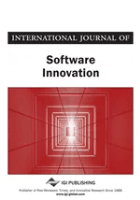
International Journal of Software Innovation
Transforming Ideas into Software Breakthroughs.The International Journal of Software Innovation, published by IGI Global, serves as a crucial platform for disseminating cutting-edge research in the field of software engineering and innovation. With its ISSN 2166-7160 and E-ISSN 2166-7179, this journal has a broad scope that encompasses multiple areas of computer science, including Artificial Intelligence, Computer Graphics and Computer-Aided Design, Computer Networks and Communications, Software, and Computer Science Applications. Since its inception in 2017 and continuing until 2024, the journal has established itself in Q4 quartiles across various categories, reflecting both emerging trends and foundational principles in software innovation. Although it does not currently follow an Open Access model, its findings are vital for researchers, professionals, and students aiming to understand and contribute to the evolving landscape of software technologies. Located in the United States at 701 E Chocolate Ave, Ste 200, Hershey, PA 17033-1240, this journal not only offers research insight but also encourages collaboration and knowledge sharing among scholars worldwide.

Automated Software Engineering
Pioneering Research for Tomorrow's Software ChallengesAutomated Software Engineering is a premier journal dedicated to advancing the field of software engineering through the exploration of innovative methodologies, tools, and applications. Published by Springer since its inception in 1994, this journal has established itself as a vital resource for researchers, industry professionals, and students alike, providing insights into the latest trends and technological advancements. With an impressive impact factor and currently ranked in the Q2 quartile of the Software category, it is recognized for its contribution to the discipline. The journal covers a broad scope of topics including automation in software development, empirical studies, and theoretical advancements, fostering discussions that bridge academia and industry. As we look forward to converging towards the year 2024, the journal continues to invite high-quality submissions that challenge existing paradigms and pave the way for future innovations in software engineering.
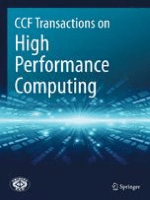
CCF Transactions on High Performance Computing
Bridging Theory and Practice in Computational ExcellenceCCF Transactions on High Performance Computing, published by SPRINGERNATURE, is an esteemed academic journal dedicated to advancing research in the field of high-performance computing. With an ISSN of 2524-4922 and E-ISSN of 2524-4930, this journal provides a platform for disseminating innovative findings, methodologies, and technologies that shape computational practices within various domains. Operating from Germany, it serves a global audience, reinforcing its impact through an impressive categorization in the Q3 quartile across multiple fields, including Computer Science Applications and Information Systems. The journal, which covers research from 2019 to 2024, plays a crucial role in bridging gaps between theory and practical implementation in hardware architecture and software systems. Although it is not an open-access journal, its contributions are invaluable for researchers, professionals, and students invested in the continuous evolution of high-performance computing. With Scopus rankings that highlight its relevance and influence in the academic community, CCF Transactions on High Performance Computing remains a key resource for the latest developments in this dynamic and rapidly evolving discipline.
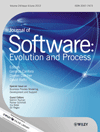
Journal of Software-Evolution and Process
Transforming Insights into Software SolutionsThe Journal of Software-Evolution and Process, published by WILEY, is a premier academic journal dedicated to advancing knowledge in the field of software evolution and methodologies. With an impact factor that places it in the Q2 quartile of software-related research, this journal is widely recognized for its rigorous peer-reviewed articles that explore the dynamics of software development, maintenance, and transformation. Addressing the challenges faced by software engineers and researchers, the journal seeks to provide innovative insights and solutions, fostering both theoretical understanding and practical applications. Since its inception in 2012, Journal of Software-Evolution and Process has contributed significantly to the academic community, featuring research that is highly relevant to contemporary trends and technologies in the software industry. For those committed to enhancing their expertise, this journal provides an invaluable resource via open access options.
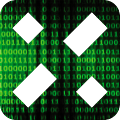
SoftwareX
Bridging Knowledge Gaps in Software ApplicationsSoftwareX is an innovative open-access journal published by Elsevier that has been championing advancements in the fields of Computer Science and Software since its inception in 2015. With a focus on presenting high-quality research, SoftwareX aims to foster collaboration and knowledge exchange among researchers and practitioners, advancing the way software and tools are developed and disseminated within the community. This journal operates under a flexible access model, allowing broad visibility and accessibility to its diverse readership. Positioned in the Q2 and Q3 quartiles of the Scopus ranking system within the domains of Computer Science Applications and Software respectively, SoftwareX stands as an influential platform for sharing cutting-edge methodologies and innovations. The journal's aim is not only to serve as a repository of knowledge but also to embolden practitioners and scholars alike to engage with and implement findings that can accelerate progress within the realms of software engineering and application. Situated in Amsterdam, Netherlands, SoftwareX has embraced an international reach, welcoming submissions that address complex challenges through novel software solutions.

FORMAL ASPECTS OF COMPUTING
Catalyzing Knowledge in Software and Theoretical DisciplinesFORMAL ASPECTS OF COMPUTING is a distinguished journal published by the ASSOCIATION FOR COMPUTING MACHINERY, dedicated to the fields of Software Engineering and Theoretical Computer Science. With the ISSN 0934-5043 and E-ISSN 1433-299X, this journal has made a significant impact in its categories, achieving a Q3 ranking in both Software and Theoretical Computer Science as of 2023. The journal spans over three decades since its inception in 1989, providing a platform for high-quality research that addresses critical formal methods and their applications in computing. While it currently does not offer open access, it remains an essential resource for researchers and practitioners in the field. The journal's credibility is bolstered by its Scopus rankings, placing it in the top half of both theoretical and software-related fields. By engaging with current trends and fostering innovative approaches, FORMAL ASPECTS OF COMPUTING stands as a vital repository of knowledge and a catalyst for future advancements in the discipline.
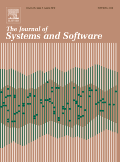
JOURNAL OF SYSTEMS AND SOFTWARE
Leading Insights in Systems and Software Research.JOURNAL OF SYSTEMS AND SOFTWARE, published by Elsevier Science Inc, is a premier academic journal that serves as a vital platform for the dissemination of cutting-edge research in the fields of software engineering, information systems, and hardware architecture. With an impressive impact factor and consistently ranking in the Q1 category across several relevant sectors, including hardware and architecture (ranked 33rd out of 177), information systems (ranked 72nd out of 394), and software (ranked 75th out of 407) as of 2023, this journal is recognized for its rigorous peer-review process and high-quality publications. Established in 1979, the journal has become an essential resource for researchers, professionals, and students looking to stay abreast of the latest advancements and emerging trends in systems and software. While the journal does not currently operate under an open-access model, it ensures wide visibility through its indexed publications and is dedicated to advancing scholarly discourse in computer science. With contributions from leading experts in the field, JOURNAL OF SYSTEMS AND SOFTWARE continues to shape the landscape of software and systems research.